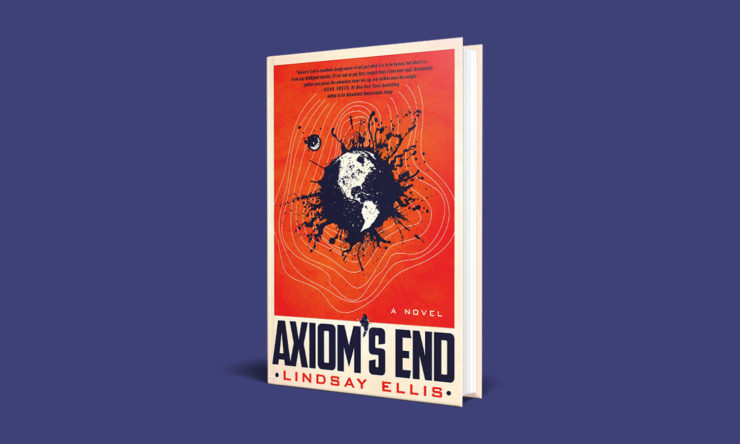Cora Sabino is already at her wit’s end when the second meteor hits. Freshly dropped out of college and with nothing but a broken-down car and a bad dye-job to her name, she’s living every twenty-something’s dream: moving back in with her mom and losing a battle with her own self-loathing. So when Nils Ortega—Cora’s estranged father and infamous whistleblower—publishes proof that the US government has been covering up contact with extraterrestrials, Cora’s like, this might as well happen. What she doesn’t expect is to get drawn into the fray. What she doesn’t expect is to make discoveries that her father could only dream of.
Video essayist Lindsay Ellis’ first novel, Axiom’s End, is every bit as cinematic and action-packed as her viewers and fans might expect. Set in 2007, it follows Cora as she grapples with her own first contact—an alien she calls Ampersand—and with what it means to not be alone in the universe. As Ampersand’s only translator, Cora is poised to learn more about alien life and history than any other human before her. With her father’s conspiracies breathing down her neck, however, she has to face the question: who among humanity can she trust with this dangerous new knowledge? Certainly not the government—or her loved ones—that have been lying all along.
When I say Axiom’s End is cinematic, it’s not just because I associate the first contact genre more with film than I do novels (though that’s certainly part of it)—it’s also fast-paced, visual, and satisfyingly trope-y. Ellis knows how to make tropes—from protagonists befriending their alien counterparts to dogs (almost) dying to raise stakes in the first real action scene—effective without ever feeling cold or methodical. Besides being thrilling and readable, there’s real heart to the novel, and that more than anything is its sticking point. You can’t help but be invested in Cora and Ampersand’s awkward, blossoming relationship. In fact, rooting for them in all their strangeness and prickliness (even if you don’t relate to them very much) gets to the center of the whole project.
Buy the Book


Axiom’s End
The novel is, after all, about estrangement—not just between humanity and alien races, but between humans and other humans. Cora’s relationship with her father is present in every moment of the novel, even when Nils isn’t directly named. Excerpts from his blog even intersperse the chapters—the reader can’t forget about him and neither can Cora. Their goals are in conflict despite them never interacting and even (presumably) without Nils ever knowing. There’s a real sense of loss and grief that comes from this, of what might-have-been and what might-be-impossible. Ampersand acts a stand-in for Nils—providing comfort and companionship for Cora where before she had been alone, and even grappling with the questions of transparency and responsibility that Nils constantly elides. It’s lovely to witness, even when you’re not sure you can trust Ampersand—and isn’t that just a fundamental truth about building any kind of relationship?
Because of this relationship, I thought often while reading Axiom’s End of Leah Thomas’ YA novel When Light Left Us. Thomas’ novel—about a family dealing with the aftermath of an alien encounter—harkens from the same sub-genre, though its sub-sub-genre (child contact versus thriller) makes for a very different tone. That said, the books are fascinating to hold side-by-side. They both deal with recovering from the loss of a father and with learning how to form trusting relationships in his absence. They both look specifically at the role of language—its imperfections, its limitations—in making those connections. Their similarities made me wonder: what is inherent to this sub-genre that would attract this kind of reading of loss, loneliness, and connection? The inherent barriers of language and culture are certainly part of it, though I think it gets to something more fundamental than that: the sense that the universe is so much bigger than us pervades first contact stories, so where better to explore our own personal estrangement? What does it mean to be alone or together in a world so vast?
Despite what I found to be quite deft and graceful themes like the ones I’ve discussed here, the novel is clumsy in places. I experienced many instances of “well, that’s convenient”—such as Cora constantly happening upon key events, or her being able to crawl through a building’s vent system on a dime (yes, I know it’s a trope, don’t @ me). It’s easy most of the time to suspend disbelief due to the intense pace of the action and narrative (for instance, I didn’t bat an eye at characters delivering exposition—and boy are they forthcoming!), but every once in a while, my incredulity conflicted with what is otherwise a pretty emotionally real tone.
Overall, though, Axiom’s End is a delight—insightful, humane and engaging, even in its imperfections. Its setting alone—pre-Obama and pre-Tea Party, a moment when hope and cynicism were basically mud-wrestling—sets a mood of distrust and malaise, and invites readers to reflect on alternative aftermaths to recent history. (And then of course—minor spoiler—it must have been awfully satisfying to write George W. Bush’s resignation!) The choice was inspired on Ellis’ part. I will happily pick up another of her novels, sequel or otherwise.
Axiom’s End is available from St Martin’s Press.
Em Nordling reads and writes in Louisville, KY.











I was ready for the crawling-thorugh-vents trope, and if you’re not reading closely I can see why you’d assume it’s the same old duct thing. But that’s not what’s written.
The books says (p. 84. check it yourself) she lifted a suspended ceiling tile, not a vent grate. She crawled up on to the ceiling tiles/tile support frame, (realistically concerned that they wouldn’t hold her weight) and *followed* an air duct into the next room, in order to climb back down and escape. It doesn’t say she went *into* the air duct, only that she used it to guide her out of the room.
I would guess this is all calculated; Lindsay Ellis has heard of all the well known tropes once or twice, and she knows what everyone is assuming when they see “duct” and “escape” on a page.